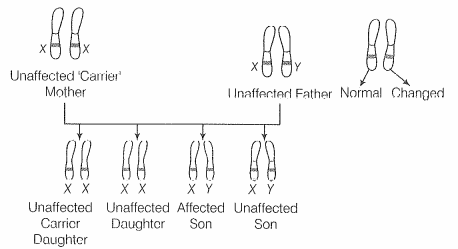Q.4. If a genetic disease is transferred from a phenotypically normal but carrier female to only some of the male progeny, the disease is
a. autosomal dominant
b. autosomal recessive
c. sex-linked dominant
d. sex-linked recessive
(d) Most sex-linked (X-linked) conditions are recessive. This means that in a person with two X-chromosomes (female), both copies of a gene (i.e., one of each X-chromosome), must have a change or mutation whereas in a person with one X-chromosomes (males), only one copy of gene must have a mutation.
A female with a mutation is one of a gene on the X-chromosome is said to be a 'carrier' for an X-linked condition

For X-linked recessive disorders, an unaffected carrier mother who has a mutation in a gene on the X-chromosome to her children.
Autosomal dominant inheritance refers to the pattern of inheritance of a condition directly or indirectly due to a dominant faulty gene located on an autosome.
Autosomal recessive inheritance is the condition caused directly or indirectly due to a recessive faulty gene copy on an autosome.
Sex-linked dominant is a rare trait that is caused by a single abnormal gene on the X-chromosome.

© 2026 GoodEd Technologies Pvt. Ltd.